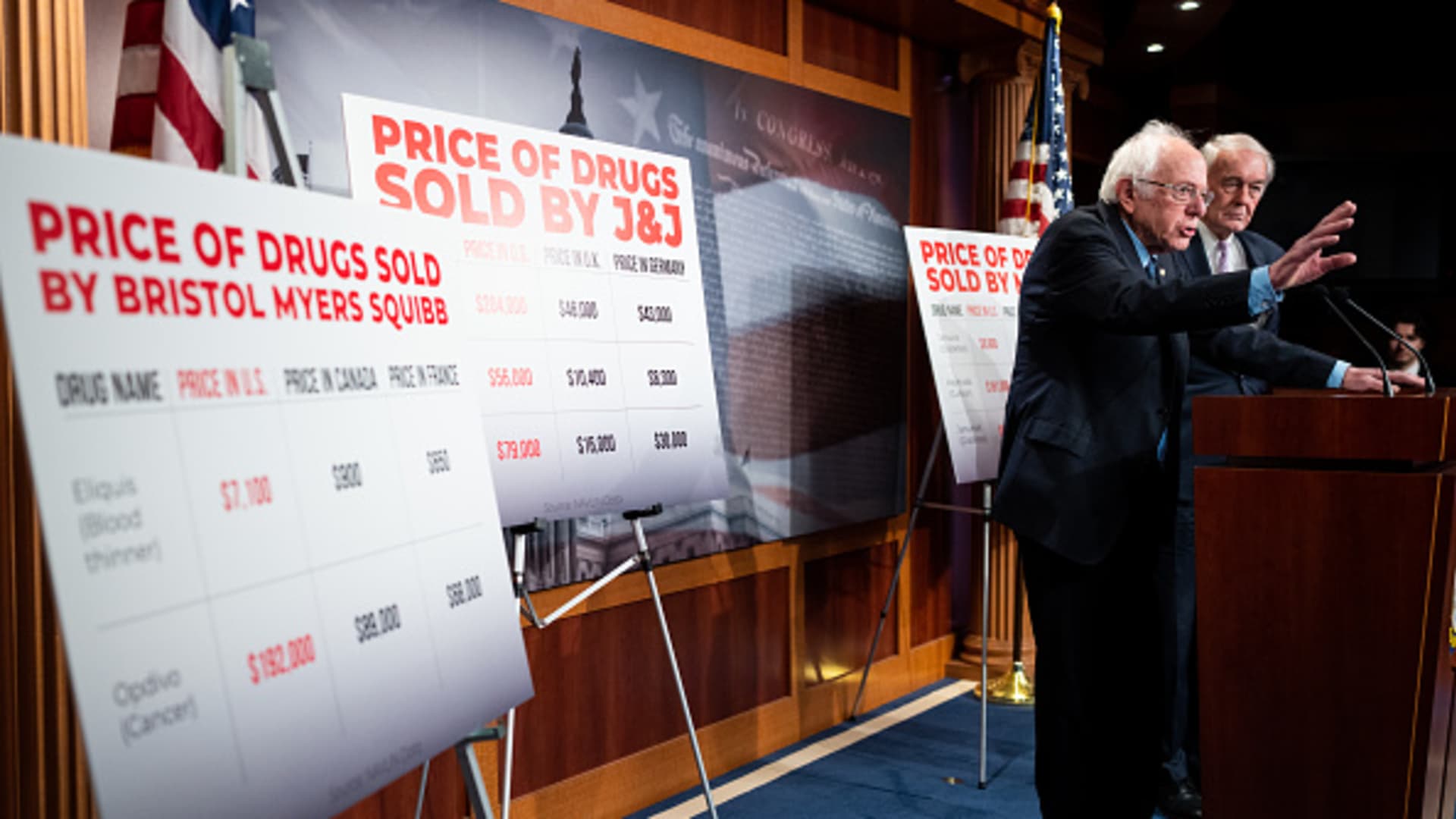
Sen. Bernie Sanders, left, appears at a news conference with Sen. Ed Markey on issuing subpoenas for pharmaceutical company CEOs to testify regarding drug prices, in the Capitol, Jan. 25, 2024.
Bill Clark | Cq-roll Call, Inc. | Getty Images
Senators will question the CEOs of Johnson & Johnson, Merck and Bristol Myers Squibb on U.S. drug prices at a hearing Thursday, as lawmakers on both sides of the aisle work to rein in high health-care costs for Americans.
The push to cut drug prices is one of those rare hot-button issues that unites the two major political parties, even though they often back different approaches.
Roughly 9 million American adults did not take their drugs as prescribed in 2021 due to the high cost of medications, according to a federal survey. Prescription drug prices in the U.S. are also more than 2.5 times as high as those in other high-income nations, another federal report showed.
The Senate Health, Education, Labor and Pensions Committee says that’s especially true for some of the top drugs from J&J, Merck and Bristol Myers Squibb.
The committee’s hearing will begin at 10 a.m. ET and include testimony from J&J CEO Joaquin Duato, Merck CEO Robert Davis and Bristol Myers Squibb CEO Chris Boerner. Duato and Davis had initially declined to appear.
Ahead of the hearing, the committee noted that the three companies manufacture some of the most expensive drugs sold in the U.S.: Merck’s immunotherapy drug Keytruda, Bristol Myers Squibb’s blood thinner Eliquis, and J&J’s immunosuppressive medication Stelara.
Sen. Bernie Sanders, who chairs the Senate Health panel, hopes the hearing could bear fruit for Americans, especially after Eli Lilly’s CEO promised not to raise the prices of the company’s insulin products during a similar hearing in May.
A Merck spokesperson told CNBC in January that the company hopes that “this will be a productive hearing aimed at enhancing the committee’s understanding of the pharmaceutical industry and finding common sense solutions to the challenges facing patients.”
A spokesperson for J&J told CNBC in January that the company looks forward to “building an understanding of our longstanding efforts to improve affordability and access to medicines.”
A spokesperson for Bristol Myers Squibb did not immediately respond to a request for comment ahead of the hearing.
Annual drug costs, launch prices and patents
In a report released Tuesday, the Senate committee said the current annual cost of Keytruda is $191,000 in the U.S. but significantly lower in Germany, at $89,000, and in Japan, at $44,000.
The panel’s report cited drug pricing and reimbursement data from NAVLIN, a drug price database. The costs reflected are list prices of the drugs before insurance and other rebates.
The report also noted that Keytruda’s annual cost has increased over time: It was $147,000 in 2015, the first full year the drug was on the market.
Meanwhile, the current annual cost of Eliquis is $7,100 in the U.S. but just $940 in Japan and $770 in Germany, according to the report. Bristol Myers Squibb began selling the treatment in 2013 for $3,100 in the U.S. and $1,000 in Japan.
The report said the current annual cost of Stelara is $79,000 in the U.S., while it’s $14,000 in Japan and $30,000 in Germany.
The three drugmakers “begin by setting exorbitant prices for new drugs,” the panel wrote in its report. “Then, as patients come to rely on these drugs, these companies raise prices, forcing patients to pay more or abandon ongoing treatment.”
The report also highlighted strategies that the committee said J&J, Merck and Bristol Myers Squibb have been using to “preserve their pricing power by any means necessary.” That includes filing more patents on the same medicine to extend its exclusivity, barring cheaper copycats from entering the market.
Merck holds 64 active patents and 51 pending patents on Keytruda, according to the report, which cited a database called the I-MAK Drug Patent Book.
Johnson & Johnson currently has 15 active patents and 21 pending patents on Stelara. Meanwhile, Bristol Myers Squibb holds 18 active patents and two pending patents on Eliquis.
List prices are also increasing for new drugs that the three companies roll out, the report said.
From 2004 to 2008, the median launch price of new prescription drugs sold by J&J, Merck and Bristol Myers Squibb was more than $14,000. But over the past five years, the median launch price of new drugs sold by those companies was more than $238,000.
The report also said that J&J and Bristol Myers Squibb each spent $3.2 billion more on stock buybacks, dividends and executive compensation than they did on research and development for finding new drugs in 2022. Merck, however, spent less on executive compensation than on R&D that year, the report said.
Notably, some of the top drugs from the three companies will be subject to the first round of Medicare drug price negotiations, a key policy under the Inflation Reduction Act that aims to make costly medications more affordable for seniors. That includes Eliquis, Stelara and Merck’s diabetes drug Januvia.
J&J, Merck and Bristol Myers Squibb are all suing to halt the negotiations, which will establish new prices to take effect in 2026.
Don’t miss these stories from CNBC PRO:







